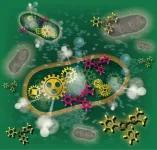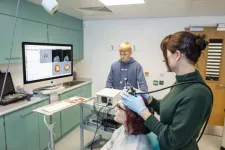In what’s known as the cluster effect, industries boom when similar businesses share a single locale. In San Francisco, there’s Silicon Valley. For cutting-edge fashion and media, there’s New York City. And according to a new report from the Friedman School of Nutrition Science and Policy at Tufts University, when it comes to innovation in food technology, Boston has become a bona fide magnet.
But what exactly is food technology, or food tech for short, and how can it solve the current food system’s most dire dilemmas?
The report from the Food and Nutrition Innovation Institute (FNII), titled Boston Foodtech 2023, defines food tech as the application of software, hardware, and the hard sciences to the food supply chain, from farm to consumption. Advancements within the food sector are critical, experts claim, as climate change and political warfare continue to disrupt the predictability and sustainability of the world’s food supply.
Now, researchers say New England is where a majority of food tech pioneers are flourishing. In the Greater Boston area, which includes the inner and outer suburbs of the Massachusetts capital, more than 130 companies and organizations are quietly revolutionizing nearly every aspect of the food added-value chain, from production to trading to diner’s plates.
“I think the best way to understand food tech is to think of an apple,” said researcher Isabella Citone, N22. “From seed form to the actual apple that’s being eaten, every step of the way features some form of technology, making the movement up the food value chain more efficient, more sustainable, and healthier, or some combination of those things.”
Specific technologies involved consist of advanced sensors and robotics, artificial intelligence, and the application of biotechnologies. These techniques are used to improve food production, enhance nutrition, reduce environmental impact, and best of all, boost enjoyment to the consumer.
“Food tech is not the food. It’s not about inventing new foods. It’s about the technology—for example, automation, robotics, life sciences—that underpins what goes into creating a better food system,” said Katie Stebbins, executive director of the FNII. The new report is the FNII’s first.
Per the research, Boston’s 138 food tech companies and14 organizations, and more than 13,000 employees combine to make the city America’s leader in the growing field. The region is poised to attract and retain top talent, given the substantial population of STEM graduates in Massachusetts, larger than in any other state. Between 2019 and 2022, capital investments in Boston’s food tech firms totaled $8.3 billion.
“Boston actually represents technology applications along the entire food value chain,” Stebbins said. “Where other places might have one piece of the puzzle, such as a consumer-facing app or a strong focus on agricultural technology, in Massachusetts we do all of that really well, so we can address most of the challenges the food system faces right here as a community.”
Home to an extensive number of U.S. companies dealing directly in food tech, Boston also ranks highly in closely related fields, such as healthcare, biotechnology, robotics, and the life sciences. Its world-class research universities routinely produce breakthroughs in science and technology, according to the report, resulting in a host of novel products and methods in food production.
“There are a lot of reasons this city is a pillar of economic development in food tech,” said Fiorenzo Omenetto, the Frank C. Doble Professor of Engineering and a professor of biomedical engineering at Tufts School of Engineering. He is also co-founder of Mori, a company that makes an edible, silk-derived layer designed to significantly extend the freshness of food. “Boston is an incredibly research-oriented city with a very strong academic presence, a very strong entrepreneurial presence, and a very strong, very old, traditional industrial presence.”
Less old is its demographic, in contrast. “Boston is a young city,” said Lauren Abda, N12, CEO of Branchfood, a launchpad for food innovation that connects industry stakeholders through curated events, investments, shared workspaces, and advisory support. “Younger generations are more attuned to the personal and planetary impacts of their food choices, so they have a demonstrated interest in the health, wellness, and convenience services that provide so many opportunities for new business creation."
“And they’re not just creating companies that are nice to have,” Abda continued. “Many entrepreneurs intend to solve real industry problems, with products that address the environmental impact of food, improve access and affordability, and reduce waste.”
Currently, the way food is typically produced, processed, and packaged is the cause of one-third of the world’s greenhouse gas emissions. How it is grown and eventually brought to tables presents additional issues. Agricultural workers, many of whom are undocumented immigrants to the U.S. and lack health insurance, regularly toil under conditions of extreme heat and chronic air pollution.
“The food system is notoriously home to some of the most dull, dirty, and dangerous jobs in the country,” Stebbins said. “And food tech, in my opinion, is unbelievably important in solving that problem, in creating jobs and pathways that people want to go towards and enjoy doing every day.”
In farming, advancements in agricultural technology, also known as agtech, range from machinery that helps to streamline labor-intensive tasks to planet-friendlier feeds, seeds, and fertilizers. The company Tomorrow.io provides precise weather data to aid in the timely planting and irrigation of crops, for example. And, in biotech, Ginkgo Bioworks and Motif FoodWorks harness biology to create craveable plant-based proteins. For consumers, brands like Sharkninja simplify eating and drinking healthier at home, while point-of-sale systems developed by Toast ease the process of placing in-person restaurant orders. Each of these companies are located in Greater Boston and together employ hundreds of Massachusetts residents.
For Citone, the city is rife with possibilities for anyone with a vested interest in revolutionizing the way we eat and helping fix our food system via technology that didn’t exist before. “Boston is a unique and powerful place. Not only do we have innovators and entrepreneurs, we also have undergraduate and graduate students who are saying, ‘I’m into food, I’m into agriculture, farming, and nutrition. I care about the Earth and I care about people. What can I do?’” she said.
“And what we’re saying with this report is, here is a place, an intersection, where, if you have the passion and the knowledge and the expertise, you can show up and make a mark.”
END



